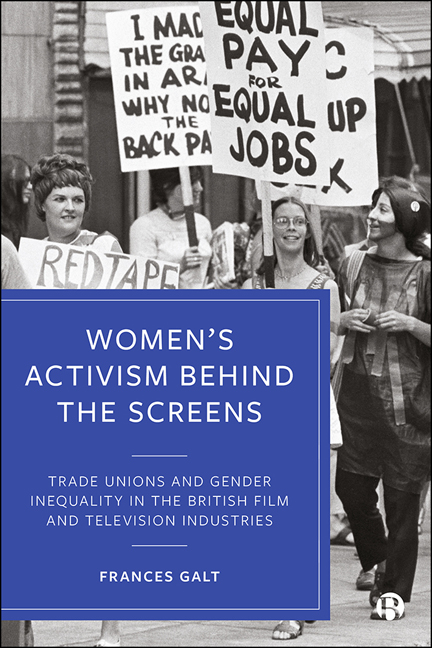 Women's Activism Behind the Screens
Women's Activism Behind the Screens 5 - Women and BECTU, 1991–2017
Published online by Cambridge University Press: 17 April 2021
Summary
In 1988, the Association of Cinematograph, Television and Allied Technicians voted to amalgamate with the Broadcasting and Entertainment Trades Alliance, resulting in the formation of the Broadcasting, Entertainment, Cinematograph and Technicians Union in 1991. Between 1988 and 1991, ACTT women activists voiced their anxiety about the impact of amalgamation on the structural gains they had achieved over the course of the 1980s as a result of the formalization of women's representation, which included a Women Members’ Committee, annual women's conferences and a full-time Equality Officer in the ACTT's Head Office. These activists argued that the increased membership of the new union and the absence of similar structures for women members in BETA would undermine the ACTT's achievements and threaten the role of the Equality Officer, as discussed in the previous chapter. Women's fears were quickly realized, as the financial crisis that had driven amalgamation resulted in the swift abandonment of annual women's conferences. Over the course of the 1990s, the Women Members’ Committee was submerged into the General Equality Committee and the Equality Officer role was diluted until it ceased to exist altogether in 1999. On the other hand, black and minority ethnic members made considerable progress on racial equality between 1991 and 2017 as the Black Members’ Sub-Committee was formalized into the new union's structure in BECTU's first rulebook in 1991, securing its place on the union agenda and shaping the union's equality campaigning priorities for the next 25 years.
Annual women's conferences were reintroduced in 2003, in the context of greater financial stability within the union and a more favourable political climate under a ‘(relatively) union friendly and pro-equality Labour government’ (Kirton, 2019: 351). This signalled a renewed commitment to women's representation and their genderspecific concerns in BECTU. Women's separate self-organization again raised the profile of women's demands within the union and facilitated women's activity; for instance, the General Equality Committee pursued a campaign on domestic violence as a workplace issue between 2004 and 2007. In 2010, BECTU elected its first woman president, Christine Bond (2010–14), and women have continued to hold the role since – Jane Perry (2014–16) and Ann Jones (2016–present).
- Type
- Chapter
- Information
- Women's Activism Behind the ScreensTrade Unions and Gender Inequality in the British Film and Television Industries, pp. 173 - 196Publisher: Bristol University PressPrint publication year: 2020


